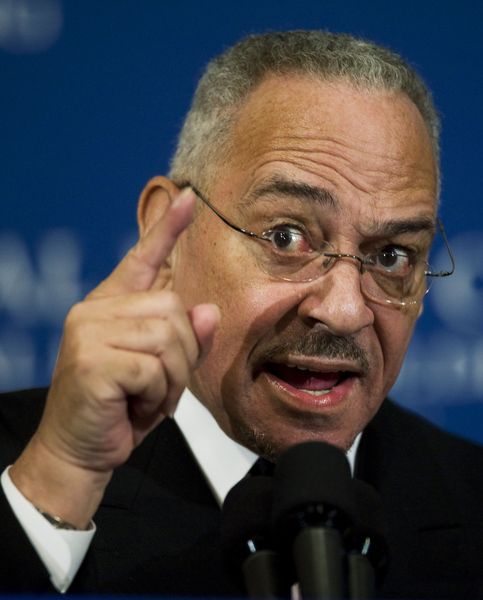President Obama vs. The Catholic Church
What’s more important to you: Women’s health or religious freedom?
That question, playing out in heated debates across the nation, may help determine whether or not President Obama can win re-election.
The controversy centers around the Obama Administration’s decision last month to require Catholic universities, hospitals, and charities to provide free access to contraceptives for employees and students (churches themselves are exempt from the ruling). The ruling is consistent with a provision in the President’s health care law that requires most health insurance plans to offer contraceptives at no charge.
As you might imagine, that mandate isn’t being greeted warmly by many Catholic leaders. John Garvey, president of Washington D.C.’s Catholic University, says:
“It requires us to contradict in our actions the very lessons that we’re teaching with our words…it makes us hypocrites in front of the students we’re trying to educate.”
Still, many employees who work for Catholic institutions aren’t Catholic; neither are many of the students who attend Catholic universities. And a whopping 98 percent of Catholic women are using or have used contraception at some point in their lives, seemingly adding credence to the President’s position.
Women’s health advocates point to the nonpartisan Institute of Medicine, whose 2011 report says that contraception is critical:
“In 2008, about half of all pregnancies in the United States were unplanned, and 42 percent of the unintended pregnancies ended in abortion. When the use of birth control went up, rates of unintended pregnancy and abortion fell.”
These types of cultural issues are among the toughest for presidents to navigate, since they are rooted in two very strong value arguments – in this case, women’s health vs. religious freedom. (That may be a false choice, but that’s the way advocates on each side have chosen to frame their own debate). The Obama Administration has tried to make the case that there’s a difference between a church and a college, but that argument has been too nuanced to cut through the clutter thus far. I’m skeptical it ever will.
The most dangerous moments for politicians are often the ones that reinforce a widely-held narrative.
President Obama is already viewed by millions with skepticism over his own religious faith, triggered by some illegitimate concerns (e.g. that he’s a “secret Muslim”) and some legitimate ones (e.g. telling donors at a San Francisco fundraiser that when people ”…get bitter, they cling to guns or religion…as a way to explain their frustrations,” and his affiliation with Pastor Jeremiah Wright, best known for preaching, “God damn America”).

Pastor Jeremiah Wright created a major headache for candidate Obama in 2008.
That means that President Obama may be nearing another Jeremiah Wright moment on this issue, and needs to act quickly to avoid losing a significant-enough swath of independent voters to doom his re-election bid. Yes, this issue could become that important in the 2012 election, and his Republican opponents are doing everything they can to exploit the issue.
The President has two options: Back away from his mandate or try to reframe the debate. The White House seems to understand how heated this issue is, and is already backing away from their hard-line stance on the issue. David Axelrod, a top adviser to the President, said yesterday they would, “look for a way” to address the Catholic leadership’s concerns.
Whichever choice the President makes, he better make it fast. Once this story takes deep root, it’s going to be difficult to dig out from beneath it.
If you want to learn more about this controversy, this PBS piece does a nice job of summarizing the debate:
What do you think? Please leave your thoughts in the comments section below.

[…] Brad Phillips says the issue of religious freedom in particular is a dangerous one for President Obama because he “is already viewed by millions with skepticism over his own religious faith” and the “most dangerous moments for politicians are often the ones that reinforce a widely-held narrative.” Taegan Goddard’s Political Wire Tweet This Post Posted in Breaking News Tags: back, Culture « Santorum labels Romney ‘well-oiled weather vane’ You can leave a response, or trackback from your own site. […]
Brad, I respectfully disagree. Barring something totally dramatic on the foreign front, this election is going to be about the economy. If the economy is showing signs of real improvement come November, Obama will probably get re-elected in spite of his social issue shortcomings, just as Bill Clinton got re-elected in 1996 on the strength of an improving economy despite ethical shortcomings. And if the economy regresses, Obama is toast on that front alone. His policies on abortion rights will be academic.
Of all the Presidential elections during my lifetime (admittedly only 30 years), I can recall social issues being the deciding factor in only one – the Willie Horton election of 1988. Social issues may get used as a means to fire up base turnout (as the GOP did in 2004), but it is the economy and, on some occasions national defense and foreign policy, that swing independent voters and elections.
As for Obama’s strategy here, I think he’s better off standing his ground and firmly making a case for this provision. Any voters who are going to vote for the Republican because of this provision or the “questions about Obama’s faith” narrative probably weren’t going to vote for Obama anyway. And if Obama backs down, he perpetuates the narrative that he’s weak and cowers in the face of Republican pressure, not to mention demoralize his base that will already be less enthusiastic about taking the time needed to vote for him in November anyway.
Joshua,
Thank you for your thoughtful comment. I think you make some good points.
I’d add a couple of thoughts:
1. In an electorate as evenly divided as ours, I’d submit that these “small” issues can swing a sufficient number of voters to matter. Florida in 2000 (and thus, the presidency) hinged on 500-some votes. Iowa’s GOP primary was settled by a few dozen. If enough people perceive a “war on religion” as some of the GOP candidates are calling it – even just a few thousand people in a key state such as Ohio or Pennsylvania – it can swing the election.
2. I’d add the 2000 race to your list regarding elections that hinged on social issues. Al Gore ran away from the Clinton record due to the Lewinsky scandal. That was a bad strategic choice in hindsight, but also one made due to the sensitivities of voters concerned about morals in Washington. Mr. Gore had other problems, of course, but without the Lewinsky scandal, it’s easy to imagine he would have been president.
Thanks again, and please keep on visiting the blog!
Brad